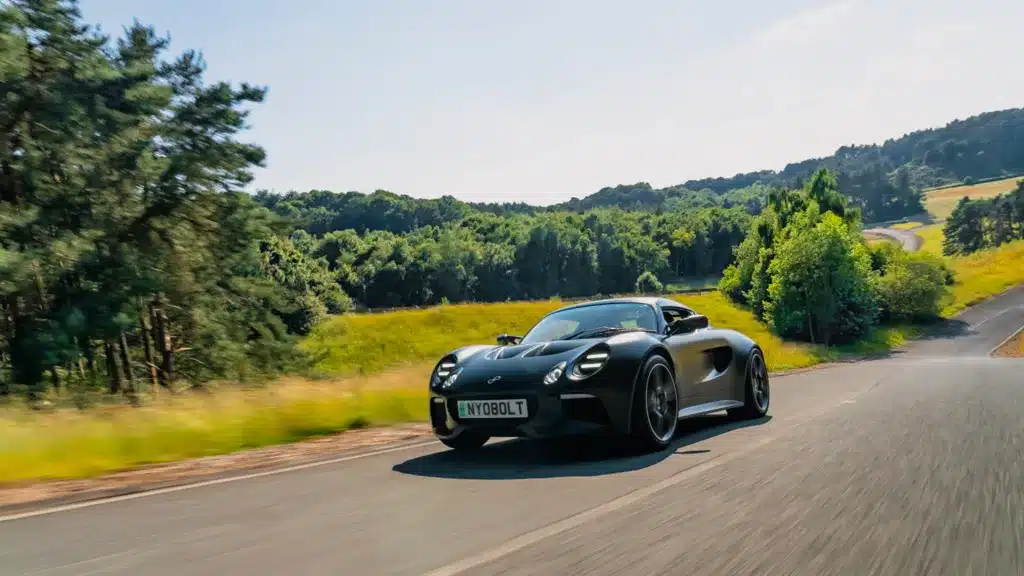UK’s Nyobolt Electric Sportscar Charges From 10% to 80% in Under 5 Minutes
UK start-up Nyobolt demonstrated a quick-charging electric vehicle battery in its sportscar prototype on a test track in Bedford, England, in its first live demonstration.
The Nyobolt battery’s ability to charge from 10% to 80% in four minutes and 37 seconds marks a significant advancement in EV technology. This development could potentially alleviate range anxiety, a common concern among potential EV owners, by drastically reducing the time needed to recharge.
By comparison, Tesla’s superchargers, which can charge to 80% in 15-20 minutes, are currently some of the fastest in widespread use. Nyobolt’s achievement, if scalable and economically viable, could further enhance the appeal of EVs by making them even more convenient for everyday use and long-distance travel.
However, as experts point out, the success of such fast-charging technology also hinges on improving the charging infrastructure. Ensuring widespread availability of fast chargers, capable of handling the increased power demands, is crucial for these advancements to make a meaningful impact on the adoption of electric vehicles.

“Developing technology that enables people to charge more quickly, which chimes with the time it currently takes to re-fuel a car – is really important,” Paul Shearing, Professor of Sustainable Energy Engineering at Oxford University, told the BBC.
The comparison highlights the progress and challenges of fast-charging technology in electric vehicles:
- Nyobolt Battery:
- Achieved a range of 120 miles after a four-minute charge from 10% to 80%.
- Represents a significant leap in charging speed, potentially transforming the convenience and usability of EVs.
- Tesla Supercharger:
- Charges to 80% in 15-20 minutes, offering up to 200 miles of range.
- Currently one of the fastest and most widely available charging solutions.
While Nyobolt’s battery showcases a much quicker charging time, the range achieved is lower compared to Tesla’s. This could be due to various factors, including battery capacity, vehicle efficiency, and energy density of the battery cells.
For Nyobolt’s technology to be competitive, further improvements in battery energy density and vehicle efficiency might be necessary. Additionally, the development of compatible charging infrastructure will be crucial to leverage such rapid charging capabilities.
If these challenges can be addressed, Nyobolt’s technology has the potential to revolutionize the EV market by significantly reducing charging times and mitigating range anxiety.
Dr. Sai Shivareddy’s comments and the live demo highlight both the potential and the challenges of Nyobolt’s fast-charging battery technology:
- Live Demonstration:
- The demo was conducted in front of industry professionals and faced real-world challenges, such as high temperatures, cooling system failure, and the use of a non-Nyobolt charger.
- These factors impacted the performance, preventing the replication of ideal laboratory conditions.
- Laboratory Results:
- In controlled conditions, Nyobolt’s battery can reportedly charge from 0% to 100% in six minutes.
- This demonstrates the battery’s potential under optimal circumstances.
- Real-World Challenges:
- The issues faced during the demo underscore the importance of robust cooling systems and compatible charging infrastructure.
- Despite these hurdles, achieving a 120-mile range after a four-minute charge in real-world conditions is a significant achievement.
- Industry Impact:
- Dr. Shivareddy’s description of the event as a “big milestone for electrification” emphasizes the importance of this development in advancing EV technology.
- His light-hearted remark about his own car still charging highlights the current limitations of existing charging infrastructure and the potential for improvement with technologies like Nyobolt’s.
Overall, the live demo, despite its challenges, showcases the progress being made in EV battery technology and the ongoing efforts to bring faster charging solutions to market. Continued advancements and overcoming real-world obstacles will be crucial for widespread adoption and success.
